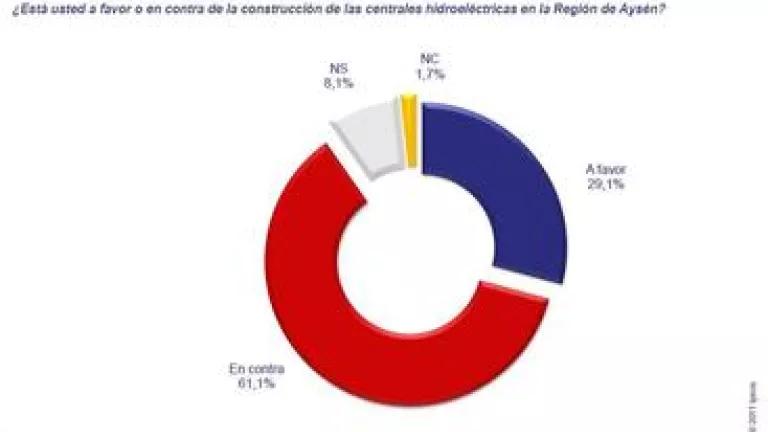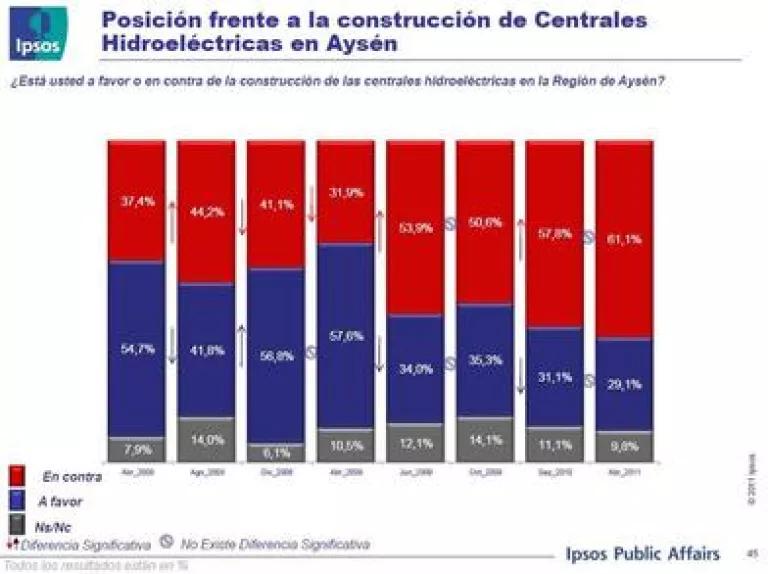New data shows that more Chileans are against HidroAysén than ever before - just as the last round of the company's environmental review process begins

A new nation-wide poll released today by international public opinion group Ipsos shows that 61.1% of Chileans are against large hydroelectric plants in the Patagonia – more than ever before. These numbers come at a critical time: on Monday, HidroAysén—the company that wants to build five dams on two of Patagonia’s wildest rivers—began what is likely to be the last round of its two and a half year-long environmental impact review process. The regional authority’s decision is expected in early May and it must avoid the irreversible mistake of bowing to political pressure to approve the project. Instead this decision should be based on scientific data, technical expertise and professional experience, which show that HidroAysén is simply not a good project. The Ipsos poll shows that a growing majority of Chileans also know that HidroAysén would be the wrong way forward for Chile. It’s time for the government to listen.
The poll asked Chileans “Are you for or against the construction of hydroelectric plants in the Aysén Region?” This first slide illustrates overall the responses to that question. Red is against (61.1%), blue is for (29.1%), white is don’t know (8.1%), and yellow is didn’t respond (1.7%). You can click on each slide for a full-sized image.
Courtesy of Ipsos, slide #43 of “Estudio de Opinión Pública,” April 2011.
The second shows how these numbers have changed since April 2008. In the last poll in September 2010, 57.8% of Chileans were against the dams; now that number is 61.1%. Though the percentages have gone up and down over the years, the general trend is clear: the amount of people against dams in Patagonia is growing. Red is against, blue is for, and gray is both don’t know plus didn’t respond.

Courtesy of Ipsos, slide #44 of “Estudio de Opinión Pública,” April 2011.
The third slide breaks the data down into gender, age, socio-economic group and geographic region. It shows that the majority of Chileans across all geographic regions, socio-economic groups, and both genders are against large hydroelectric plants in the Patagonia. Age-wise, the majority of people aged 18-24, 25-39 and 40-54 are against. Among people 55-85 years-old, 45.3% are against.

Courtesy of Ipsos, slide #44 of “Estudio de Opinión Pública,” April 2011.
These numbers are very significant. During the past six months, HidroAysén has launched an aggressive public relations and media campaign to convince Chileans that HidroAysén is necessary for the country’s future energy security. Technical studies have since shown that that is not true. The company said that HidroAysén would be a Chilean source of energy. Yet the majority owner of HidroAysén, Endesa Chile, is a transnational European company ultimately owned by the giant Italian energy company, Enel. This poll’s data illustrates that, despite HidroAysén’s media push, Chileans are not persuaded.
It also comes at a critical time, since the decision about whether or not to approve HidroAysén’s environmental impact assessment is near.
HidroAysén’s review process project began in August 2008, when the company submitted to the regional authority its environmental impact assessment for the five dams it intends to build on two of Patagonia’s wildest rivers. Since then, in three separate review rounds, citizens, technical experts, state agencies and municipalities have filed thousands of comments on the fact that the assessment documents lack sufficient and necessary data to approve the project. During the last round, in October-November 2010, agencies filed 199 comments, which the company should address in the document it delivered this past Monday. The state agencies and municipalities have until April 25th to submit their comments to the regional authority. The authority, in turn, has until early May to make its decision.
It is essential that the state agencies and regional environmental authority charged with evaluating HidroAysén’s environmental impact assessment do not succumb to political pressure to approve the project. There are better, cleaner, more secure and more local energy options available. A growing majority of Chileans know this. It’s time for the government to recognize this, too.
